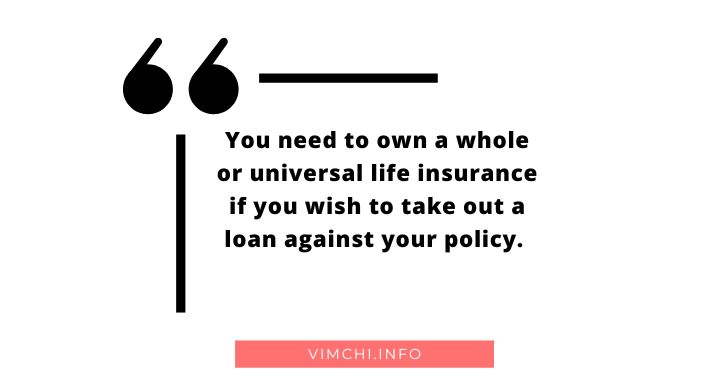
Most of you understand that having life insurance can assure your family will carry on without you if you die unexpectedly. This benefit is true for various types of life insurance. But this is not all that you can expect from having this policy.
While you are still alive, you can borrow money from your policy. Now, you may be thinking about its tax effect. Are life insurance policy loans taxable?
Are Life Insurance Policy Loans Taxable?
The good news is that when you take out a loan against your policy, it will not count as taxable income. But this will change if you surrender your policy and the amount you borrowed exceeds that you paid in.
In that case, if the money you owed against your policy exceeds what you paid, then the loan becomes a taxable event.
How Much of the Loan is Taxable?
As long as the money you borrow is equal to or less than the overall insurance premiums you paid when your policy ends, the money you owe is not taxable.
A taxable amount is equivalent to the amount of money gained. It is any amount you get from the value of your policy minus the net cost or the total premiums without distributions.
Thus, if you have a policy with a cash value of $500,000, you paid $100,000 in premiums. However, you have an outstanding policy loan of $300,000. If your policy ends, the amount you can claim as income on your taxes is only $200,000.
It can be an issue if the interest was paid with dividends instead of out of pocket. Any out-of-pocket interest payments are not tax deductible. In that case, taxes are already paid on that amount.
Thus, if you did not pay out of pocket, it does not cover the amount of interest due. As a result, compounding interest is added to the principal amount.
If the loan is untouched, it accumulates interests for decades.
As a result, you owe taxes on a balance that is more than the amount you originally borrowed.
What Happens if the Life Insurance Policy Loan Taken Out Against the Cash Value is Not Repaid Before the Policyowner’s Death?
The cash value of the policy is used to pay premium loans. If the loan is not repaid at the time of the policy owner’s death, the amount of the loan and the interest are subtracted from the death proceeds.
That’s why before you take out a loan against your policy, make sure that you have a plan on how to repay it. Otherwise, you are at high risk of not providing any money to your surviving family at the time of your death.
If you pay back all of the loans, your beneficiaries are guaranteed to receive a certain amount that can help them get through life without you.
However, if you did not repay your loan and it is accruing interest beyond the cash value, the policy will lapse. Your insurance company may also terminate your policy. If this is the case, the loan balance and interest are not taxable income. Thus, your bill could be enormous.
Read: Should you get life insurance for your employees?
How to Borrow Money from Your Life Insurance Policy?
You need to own a whole or universal life insurance if you wish to take out a loan against your policy.
It means that if you have term life insurance, there’s no cash value component to it. Thus, you can’t borrow money from it while you are still alive.
But with permanent life insurance, you can build up a reserve of cash that you can borrow from it.
Just because you have permanent life insurance that you can borrow money from, it does not mean that everything is good.
Make sure that you understand every aspect of the policy before you borrow against the policy.
When you get a life insurance policy loan, you don’t have to go through a complicated application process. There’s no credit check or income verification.
Furthermore, the interest rate is lower than bank loans. It is also bereft of high fees. Most of them are tax-free.
And you get the borrowed money in five to 10 days.
You can use the funds in any way you choose. The cash value of your policy can be used as collateral for the loan.
You don’t have to explain to the issuer how you use the funds. This is not the same as a bank loan in which you are required to pay the borrowed amount monthly.
In other words, you can choose to let it sit without paying for the money you owed for years. But then again, if you do so, the loan can easily accumulate interest that can be added to the balance of the loan.
As mentioned, if you die without paying the loaned amount, your beneficiaries may not receive any death benefit. The reason for this is that the supposed benefits will be used to pay for the money you owed before your death.
Borrowing from the cash value may result in the collateral being moved into a secure account. Dividends earned on the investment account are decreased.
On the other hand, if you borrow money from your life insurance policy and you pay it back timely, your beneficiaries will get enough funds when you die.
The only consequence of a policy loan if you pay back timely is you have less money earning interest while you are still paying back your insurer.
But if you take out a loan and don’t pay it back, you owe taxes on the money you borrowed. It results in the death benefit being reduced.
Read: Should business owners need life insurance?
Life Insurance Policy and Its Cash Value
The big benefit of having a life insurance policy is the cash value if you choose permanent life insurance. You can take up money from the cash value after it builds up. The funds are tax-free.
While you are still alive, you can make sure of your policy by taking out a loan. But pay it back. Otherwise, the policy’s cash value will shrink. Your beneficiaries may not receive anything from the policy you purchased before your death.

Speak Now ... Or Forever Hold Your Peace